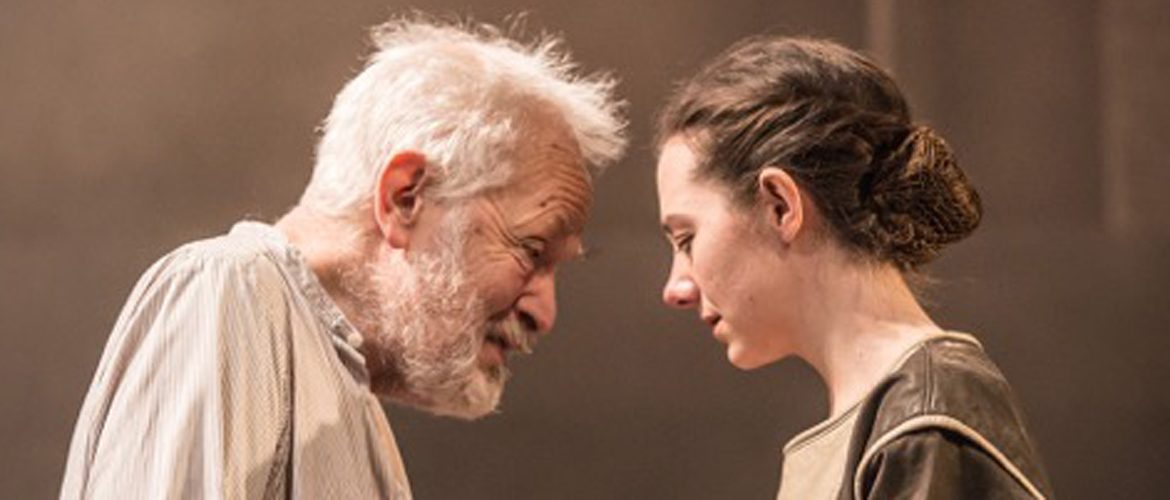‘We that are young shall never see so much, nor live so long.’
What better time to stage Shakespeare’s greatest tragedy, his exploration of the disintegration of the mind on all its forms, of fooling, madness, and the onset of dementia, than on the 400th anniversary of his death?
Of course King Lear is about much more than this, but it occurred to me, seeing it staged for the first time in a long while, how fragmented the action is.
This is made clear by the set itself: the dark grey receding walls could be those of a castle or prison. Torches flare and windows glint; we are in no doubt that this is a claustrophobic state, where (what may be) the truth appears only briefly.
And then there is that rifle shot at the start– fired by Cordelia in soldier’s uniform, who even before she refuses to ‘play’ along with her father’s demanded court performance, makes it clear that we are in a ‘state’ of unrest.
Vulnerable king

I wasn’t entirely convinced by the sound director’s use of Latin plainchant at the opening: Lear’s frequent evocation of gods and goddesses makes it clear that this is pre-Christian Britain, so this choice seemed incongruous.
However, this is a minor query in what is otherwise a meticulously detailed production.
The director Max Webster allows his actors space to develop their characters subtly: Michael Pennington, who later gives us the most vulnerable Lear, seemed to present the division of his lands with a suppressed chuckle:
Is there a suggestion here that even the King was not taking himself seriously? Needless to say, this makes his loss of control and banishment of his favoured daughter all the more shocking.
Similarly, there appeared to be a more than usual connection between Cordelia (Beth Cooke) and her suitor Burgundy (Reginald Edwards), hinting at a deeper understanding between them before the action of the play… This makes Burgundy’s rejection of his lady without a dowry doubly cruel.
[adrotate group=”4″]
Regan’s reaction to her father’s deranged pronouncement of sterility upon her is so intense as to make us feel some sympathy for her, for that moment, at least.
Both older daughters come across as genuine women who, however reprehensible their actions, have had to live with being constantly usurped in their father’s affections.
Another stand-out performance was Scott Karim as Edmund, who seemed completely believable despite – or perhaps because of – his Machiavellian pursuit of advancement.
His conviction was such that I found myself taking his side: how would I feel if my father announced to his “honourable friend” with laughter and a slap on the back, that I was a “some twelve or fourteen moonshines lag of a brother?”
Dysfunctional families

This court centres around two dysfunctional families, but of course we are never given one single perspective as to motives. Like blind Gloucester, our footing is never where we think it is, and it is this company’s absorption in their roles that makes each character’s actions – almost – explicable.
The glaring exception to this is, of course, the putting out of Gloucester’s eyes. It is such a well-known scene (even if many people don’t actually keep their eyes open though it) but even here Pip Donaghy as Gloucester made me aware of another detail that I had not realised before:
you are my guests.
Gloucester is mutilated in his own house. On the evening I attended, Gloucester attempted to reason with his torturers and seemed almost baffled that they should want to do him harm.
Mr Donaghy’s naïve interpretation made sense of his later attempts to end his life: the mercilessness of the world he finds himself in has simply become too much for him.
Must be seen

The scene on the heath highlighted another enriching question: how far away was the heath from the castle itself?
In past productions I have always assumed Lear to be wandering a great distance from his home, but in this production Kent’s frequent appearance with lanterns suggested that it might not be so great a step.
This served to make Lear’s banishment all the more terrible: his daughters know that all they need do is shut the doors upon him and he will lose himself – utterly.
His vulnerable companions dare not return their king to his castle, and so their position is even more pitiable. Perhaps this was just a peculiarity of staging, not intended to be seen as different from the norm, but if it were, it gave the scene even greater depth.
King Lear will always offer new discoveries, no matter how many times it is experienced. This company’s attention to detail makes this Lear particularly rewarding. It is on at the Grand Opera House until Saturday (May 28). It must be seen.
